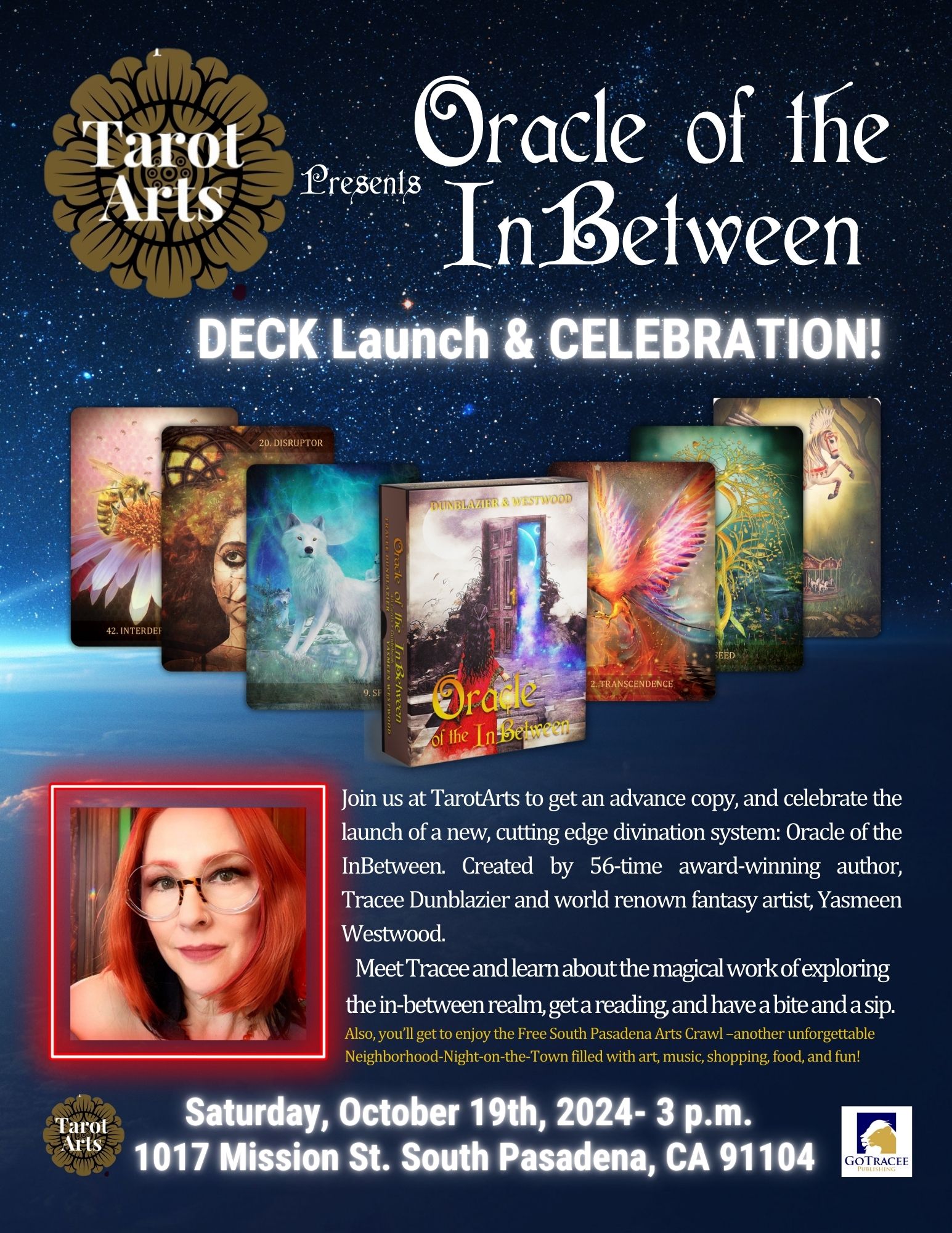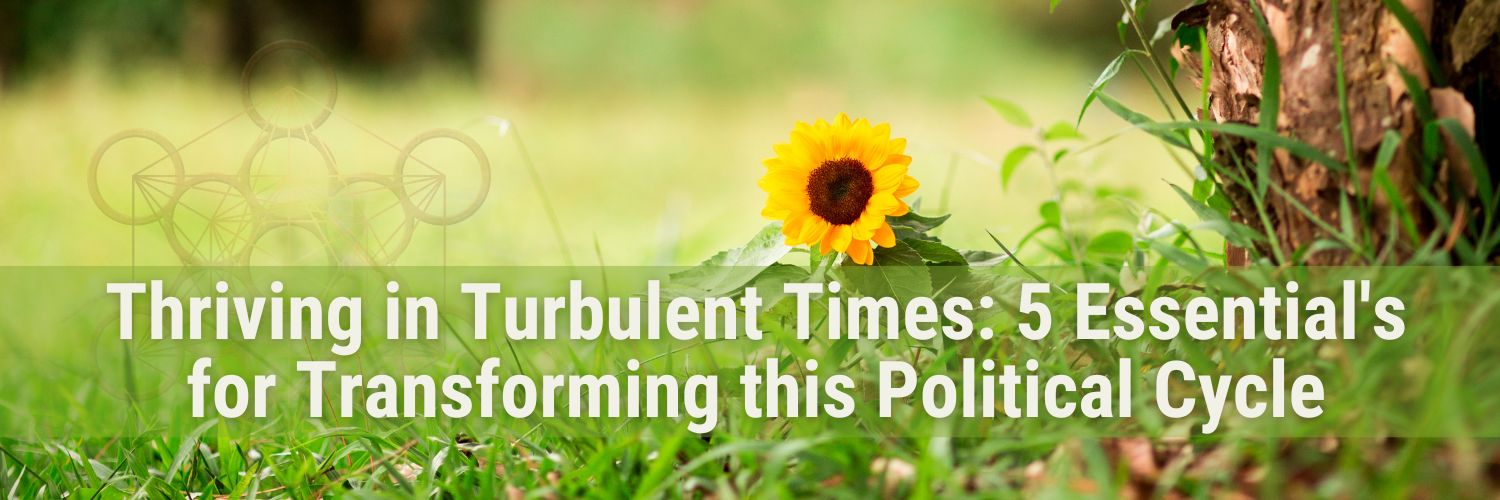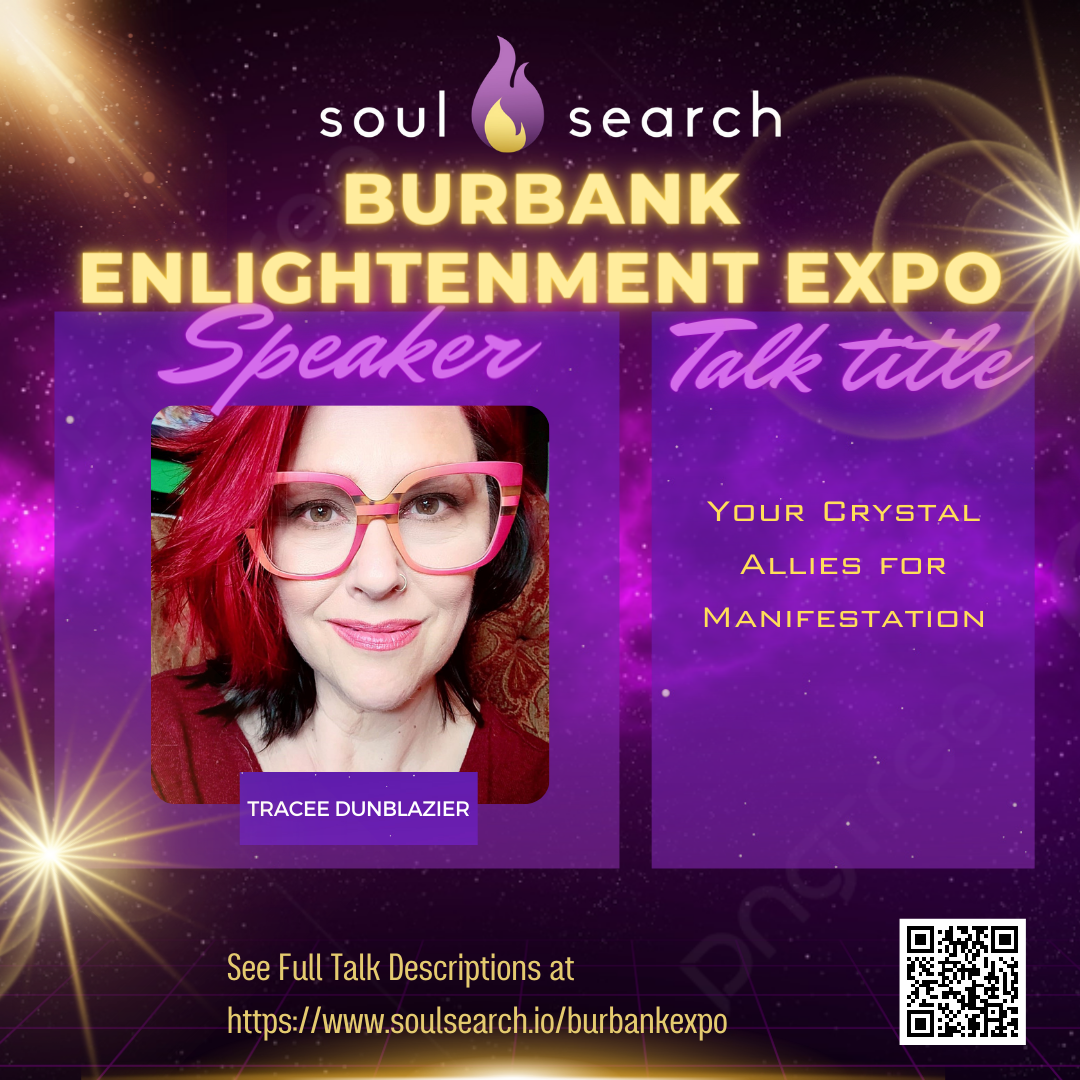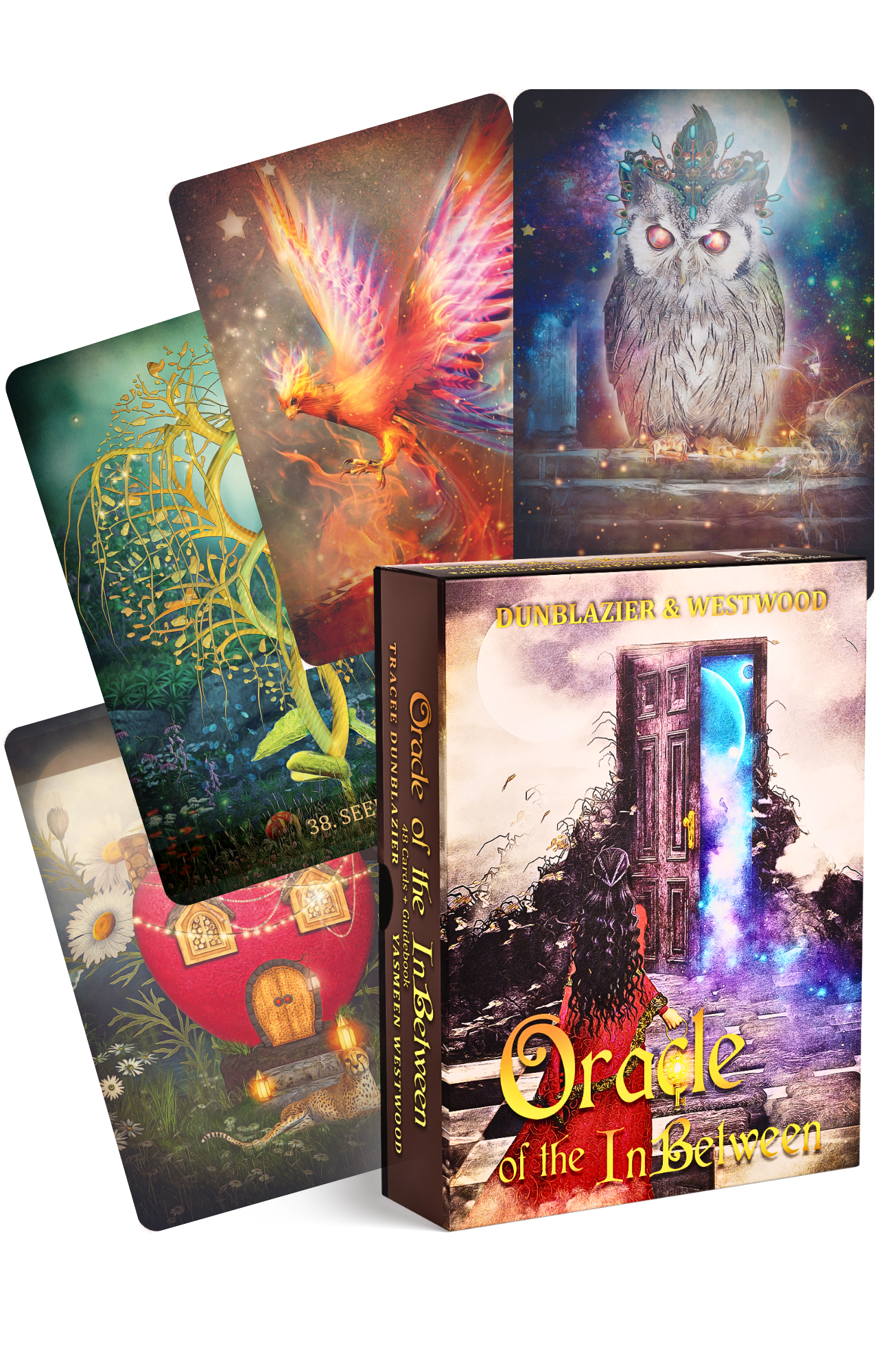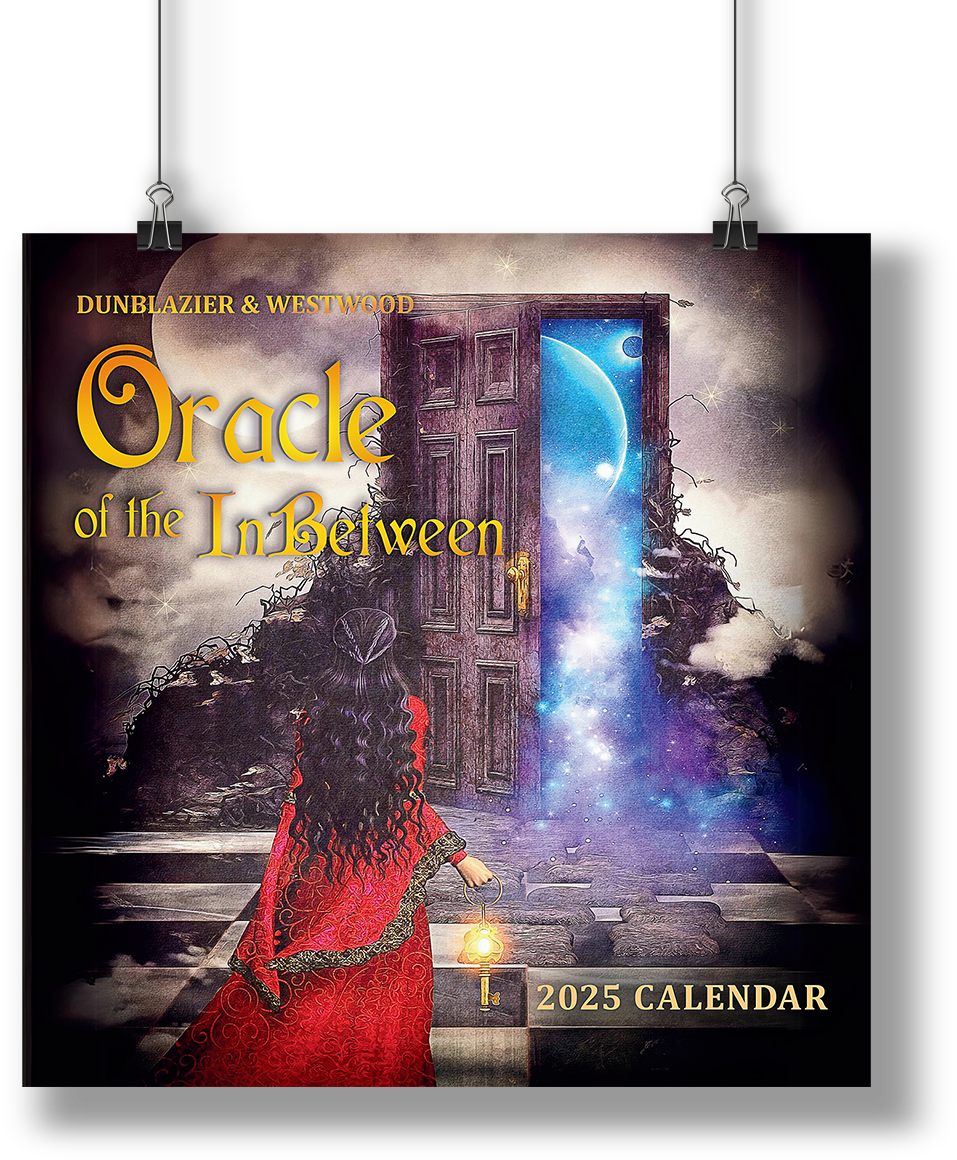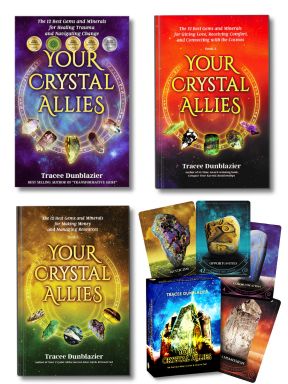
Know that the greatest power you own is your self-awareness. When you’ve got this, it’s then possible for you to, more accurately, read people and situations and make informed powerful decisions.
I had the pleasure of interviewing Tracee Dunblazier.
Tracee Dunblazier GC-C, is a Los Angeles-based spiritual empath, shaman, and five-time national award-winning author. As a multi-sensitive, Tracee’s blend of intuitive information combined with different modalities, has provided the opportunity for many to achieve deep healing and create the success and peace they seek in their lives.
Her compassionate, humorous, down-to-earth style empowers clients, readers, and listeners to address difficult topics with courage and clarity. Tracee values humor over, almost, all other qualities, the daughter of a practical joker and a laughter, she’s able to find humor in all situations — eventually. Being a past-life specialist she loves history, restoring old homes, antiques, cemeteries, and ghost hunting; photographing all of them is a fun pass-time.
Empathic, delightfully vulnerable, and profoundly real — Dunblazier’s new keynote “Conquer Your Karmic Relationships” is an enlightening presentation that will open your mind to what is happening right in front of you: the multiple energetic dimensions we all share. No matter where you sit on the spectrum of understanding, Tracee makes tangible the connection between mental wellness and spirituality.
She takes a look at your spiritual imprints and the repetitive patterns that position you in life on every level. Understanding what karma is, and learning all the ways to reveal, accept, forgive, and transform your relationships in every dimension. Not only to your beloveds and romantic entanglements, but how you relate to; food, money, family, culture, religion, sex, death, and your environment. This, sure to be standing room only seminar, will help you unearth the very core of what drives you — showing how to direct its power into usable, life-giving resources for you and all your relations.
In 2015, Tracee founded GoTracee Publishing LLC. It has since grown to be a nationally awarded Hybrid-Publisher that specializes in spiritual-healing Narrative-Nonfiction, and divination oracle decks — tools for meditation and self-discovery. Their best-selling Demon Slayer’s Handbook Series and Rainbow Warrior Activation Deck offer light in dark places. They are game changers for those who suffer.
Thank you for joining us! Can you tell our readers a little bit about yourself and what you do professionally?
I work as a spiritualist and grief counselor. My job is to assist those who are creating a better life for themselves and who may struggle with mental, emotional, or spiritual trauma. I was born psychic and empathic and grew up feeling as if I needed to hide this special ability of mine. A common dynamic in our culture, from which many struggle — a need or desire to hide who they are for fear of judgement, or worse, reprisal.
I wanted to build a bridge between those who have a visceral awareness of the spirit world and those who don’t. The goal is to create an understanding of what mental, emotional, and spiritual trauma look like outside of the mental-illness paradigm through a new language centered in spirituality.
My life’s work is to pave a way for anyone who wants to have a deeper understanding of what it means to be spiritual, who may experience anxiety, depression, fear or other intense emotions, para-normal activity, or would like to know why others do.
To this end: I started GoTracee Publishing and have written an award-winning book series called the Demon Slayer’s Handbook Series: Master Your Inner World (Vol. 1), Heal Your Soul History (Vol. 2), and Conquer Your Karmic Relationships (Vol. 3, Aug. 2020) because the world needs a broader understanding of the spiritual dimensions outside a mental illness or religious lens. The books cover a lot of ground: from spirit guides to past-lives, mastering intense emotions to telepathy, grief to life-after-death, and why we attract what we do and relate to our environment in an unconscious way. All of the books are profoundly entertaining and will guide you to more deeply understand your relationships to yourself, your world and your Creator.
Can you help define for our readers what is meant by a Highly Sensitive Person? Does it simply mean that feelings are easily hurt or offended?
Sensitivity ultimately means receptivity. Those who are sensitive have an ultra-awareness of the multiple dimensions of energy that exist and from which they receive information mentally, emotionally, and spiritually. The idea of a sensitive person getting their feelings hurt or offended is better contextualized from this perspective: When a sensitive person takes on a strong download of someone else’s emotion they literally feel it in their physical body. Like a punch to the gut from someone’s anger or a heartache from a mean or unwanted Idea or conversation.
Does a Highly Sensitive Person have a higher degree of empathy towards others? Is a Highly Sensitive Person offended by hurtful remarks made about other people?
A Highly Sensitive Person often has an enormous capacity for feeling the feelings of others which does not always translate as empathy or understanding. Those two experiences come from how a sensitive person processes the information they receive and how open they are to caring for others. In the beginning, an empath can experience feeling victimized by all the energy they take from others until they are willing and able to transmute that energy through their own emotional expression. A Highly Sensitive Person will feel the quality of what is being intended, by what is being said, or the impact those words have on another.
Does a Highly Sensitive Person have greater difficulty with certain parts of popular culture, entertainment or news, that depict emotional or physical pain? Can you explain or give a story?
Highly Sensitive people can have strong reactions to difficult or devastating world events. Consider that those with average emotional capacity, who are able to manage their emotional responses such as withholding tears at a sad event, are able to tune out the emotional vibration in their environment where an empath is less able to do so.
One, early Sunday morning, I took a client to a mass baptismal at the local mission church. The crowds (over 100 people) so overwhelmed her that she cried for twenty minutes, even after leaving the area. She had recently experienced a spiritual shift and was just opening up to her empathic receptivity. I, who at the time, had been able to tolerate that emotional environment found myself floored when 9/11 occurred two weeks later. I cried for ten-days-straight without reprieve, and then on and off for months after.
Can you please share a story about how a highly sensitive nature created problems for someone at work or socially?
A client came to me directly after beginning a new job, immediately he felt no one in the office liked him and experienced the communications of his co-workers as unkind, or at best, rude. He felt that a specific colleague judged him and was talking behind his back. He created quite a stir by reporting it to his boss.
He was expressing an extraordinary amount of paranoia that was unlike his sensitive nature, and when I asked him why he felt this way, he explained that he didn’t understand why, it was just how he was feeling. This client was always sensitive but his reactions this time around did not fit the circumstances. I noticed his face became red as he spoke about it. I asked him when he’d last had his blood pressure checked and he responded that it was never a concern for him. I suggested he get it checked by a doctor immediately. As is turned out, his blood pressure was off the charts and he was put on medication straight away. Since then, he’s been able to mend fences and have a different understanding of the people he works with, no longer misunderstanding their intent and communications.
It’s important to track that Highly Sensitive People deal with their receptivity in different ways, based on their self-awareness, relationship to spirituality, comfort with emotional expression — and sometimes health. The ultra-sensitive demographic does not always do well with authoritative figures or following rules and regulations and may have difficulty being a team player. For many reasons, it can be arduous for an HSP to be objective with their co-workers and know where their feelings end and those of others, begin.
When does the average person’s level of sensitivity rise above the societal norm? When is one seen as “too sensitive”?
This is a tricky question. I think that sensitivity and ability-to-communicate go hand-in-hand. When comparing societal norms, emotional intelligence has far more impact than sensitivity. A person’s willingness to be present, listen, and empathize with another human being is a choice. I see people use their sensitivity, or others claim someone is too sensitive when they do not have the desire to be present for the circumstances at hand and be accountable for their part in them.
I’m sure that being Highly Sensitive also gives one certain advantages. Can you tell us a few advantages that Highly Sensitive people have?
A heightened awareness can be very helpful: in mediating situations for others, having a connection to the instinct that keeps us safe, in predicting outcomes, a strong sense of right and wrong, and finally, your impact on others. Empathy is the key to taking advantage of everything that brings us pleasure in being human.
Can you share a story that you have come across where great sensitivity was actually an advantage?
Not only do I use my sensitivity every day to better understand the world around me and the people in it, but being ultra-sensitive allows those who experience it to have many options for emotional decompression. Early one morning, I was out running errands when I came across a police officer directing traffic around a fatal car accident (the body was covered in a sheet off to the side). We locked eyes as he waived me through the intersection. In that moment I took on all the panic and devastation he was unable to feel in that moment — he was the first and only one at the scene. As I continued down the road, I burst into tears and pulled over to the side in order to completely process all the emotion the officer had trained himself not to feel in times of emergency.
There seems to be no harm in being overly empathetic. What’s the line drawn between being empathetic and being Highly Sensitive?
A person who is empathetic often takes on the emotion of others where a Highly Sensitive person may recognize them but not take them on. The important thing to understand in both of these cases is that a person cannot take on something they don’t resonate with; it’s called spiritual or energetic agreement. It’s the way we all connect through our emotional lowest common denominator. Empathic and Highly Sensitive People are deeply aware of the spirit world and have an expanded and developed ability to connect on the many emotional wave-lengths of others.
Social Media can often be casually callous. How does Social Media affect a Highly Sensitive Person? How can a Highly Sensitive Person utilize the benefits of social media without being pulled down by it?
Social Media is a tricky thing for everyone in this current divisive climate. Having a developed sensitivity to others leaves one in a unique position of not always having a clear understanding of one’s own feelings compared to the feelings of others. Being connected to any public forum, virtually or in person, can generate downloads of emotional energy from that community. Learning how to set boundaries with yourself and others is the best way to manage your use of Social Media. Limiting the time you spend, and being selective with those you chose to connect with is paramount. Most of all, it’s okay to decline someone’s bid for attention or friendship and be direct and honest about it. It’s most valuable in these situations to be direct rather than passive; straight-forwardness can be a learned skill for an empath.
How would you advise your client to respond if something they hear or see bothers or affects them, but others comment that are being petty or that it is minor?
Before fully engaging with others on Social Media put some thought into what you want out of the experience. What are the social causes or beliefs you’d like to support and what kind of Interactions you’d like to have with others. This forethought will help you better navigate and set boundaries with people. Once you’re clear on those things, when or if the trolls come to comment or give you unwanted attention, you can hide, unfollow, or block anyone with whom you want no contact, or you can strategically engage the conversation for a positive outcome.
What strategies do you recommend to your clients to overcome the challenges that come with being overly sensitive without changing their caring and empathetic nature?
The three helpful strategies I recommend are deep breathing, hand yoga (mudras), and the most vital of all: learning to discern your own feelings and triggers and becoming comfortable with tearful emotional expression, as it is the most efficient way to process emotional energy.
What are the “myths” that you would like to dispel about being a Highly Sensitive Person? Can you explain what you mean?
There is a learning curve to opening to deeper sensitivity that often leaves a person feeling victimized just by being alive. The world can be a tumultuous place during this phase of emotional development and one can feel isolated, misunderstood, and alone. The myth is that we are never alone but must find ways of communicating through our emotionalism in order to not feel isolated and misunderstood.
As you know, one of the challenges of being a Highly Sensitive Person is the harmful, and dismissive sentiment of “why can’t you just stop being so sensitive?” What do you think needs to be done to make it apparent that it just doesn’t work that way?
People get upset at a person’s emotionalism when it controls the room or the narrative of a conversation and doesn’t take others into consideration. This is why the first phase of feeling victimized by one’s sensitivity is uncomfortable for everyone. It is the path of all Highly Sensitive People to become self-aware of their own triggers, desires, and needs and learn to communicate them effectively, thereby creating equal space for others to communicate their needs and desires as well. It’s not always the sensitivity that friends, family, or loved ones find difficult, it is the inevitable self-focus, for a time, that doesn’t always leave room for them.
Can you share with us your “5 Things You Need To Know To Survive And Thrive As A Highly Sensitive Person? Please give a story or an example for each.
1. Sensitivity is Receptivity: Always remember that your degree of sensitivity translates to your ability to receive from your world: everything from wisdom, insight, and foresight to love, money, and power. Your awareness of yourself and others is the way you will navigate everything that crosses your path.
One afternoon, I was preparing to go to work and was feeling a bit sluggish; I decided to take a quick nap. During that brief sleep I received a dream. I was driving on the freeway I traveled to get to work when a car in front of me, speeding, lost control and crashed causing me to crash as well. I woke up. I was visibly shaken from the dream, and as I began to consider it, I decided that in no way could that be an outcome for me. I sat, taking a few deep breaths, and visualized the same scene from my dream, only this time seeing the safety of the person whose car crashed and then my car slowing to drive easily around the accident. Eventually forgetting the dream, I went on with my day, getting into the car to drive to work a couple of hours later.
Halfway to work, driving on the curvy portion of the freeway at a speed of about sixty miles-per-hour, the road seemed clear but I noticed that my foot was pressing the break and slowing the vehicle to forty as I rounded the curve. As I slowly drove around I caught a glimpse of a car standing straight up on its front end, and by the time the car accident was in my sight; I was driving at a speed of twenty miles-per-hour — safely clearing the crash and making it to work on time. In this case, my sensitivity allowed a window of opportunity for me to choose my safety.
2. Receptivity is Power: Know that the greatest power you own is your self-awareness. When you’ve got this, it’s then possible for you to, more accurately, read people and situations and make informed powerful decisions. When you are fully receptive to the people, places, and experiences in your life; you are empowered and supported in accomplishing anything. Even when your openness brings sadness or grief.
A client, feeling overwhelmed at work, called me to help him decompress. After a short conversation it was clear that nothing I could say was going to change his position. Although he was overwhelmed, he’d emotionally shut down and there wasn’t any room for a new idea or sentiment, therefore no room for change. The following day, he shared with me that once he left work and got in the car, he cried, unloading all his stress.
Consequently, on his drive into work to the heart of the city, a hummingbird flew directly in front of his car and stayed there fluttering for a few seconds as if to communicate a message. As we pondered the possible message, it became clear: Freedom. Hummingbirds have the natural ability to fly in any direction they choose and have the longevity to be able to travel 500 miles, nonstop, on their spring and fall migrations.
Often, it’s difficult to perceive when we are emotionally shutdown. It takes the mirror of someone else to witness us in our condition, in order to get an objective perspective on ourselves. Learning to be open and receptive, especially in times of stress, is a skillset that takes practice. To make change, you’ll need to have an understanding of the reasons you shut down emotionally and then devise a strategy to make small changes, at first, and then ask for help when you need it.
3. Empathy is Knowledge: The act of feeling what someone else feels gives you enormous knowledge about that person, their experiences, and possible reactions. In fact, ascertaining knowledge in this way is more accurate than relying on a person’s self-awareness or truthfulness. It’s common to have an idea or belief about something that is completely shifted when you become aware of the emotional truth of that belief.
Those who have thoughts about others but no opportunity or ability to empathize with them, are usually inaccurate about their assumptions towards them. We see this quite a bit regarding social and cultural bias. A Highly Sensitive Person, at the beginning may hold an enormous amount of fear regarding all they feel but do not have the information to make clear the reason for the intensity of emotions they experience.
Imagine yourself in the story I told above about seeing a police officer at the scene of a fatal traffic accident. Can you imagine, driving to the grocery with milk and eggs on your mind and while enroute, receiving an emotional download from a person who has just witnessed a death? What would you do? How might you feel? Asking yourself how it would feel to be in someone else’s shoes is a powerful way to begin to understand the world around you.
4. Sensitivity is Your Connection to the World of Inspiration: It’s important to understand that even those who have trained their emotional responses to minimize their feelings and reactions, still have feelings and reactions. Regardless of your ability to express or show your emotion, there is still a lot of emotion to be felt, and if you’re not feeling it than someone else is.
Think of your emotion as a medicine ball. You have an emotion (medicine ball) that is too heavy to express within a certain event and you are unable to hold it in any way, it’s a natural response to throw it (directly or energetically) to someone who can catch it (a Highly Sensitive Person). If any of you out there have teenagers, this is a common dynamic in the household. The transferring of emotion from person to person without any real consciousness or understanding — just throwing the medicine ball to someone else the minute one begins to feel the weight of it.
I have a client who recently lost his wife, and his teenage son lost his mother. Both are grieving this complicated and unexpected death while feeling completely unequipped to process the amount of emotion they both feel at this time. Along with grief comes many other emotions that in comparison feel easier to express such as anger, resentment, and self-pity. Those are the medicine balls being thrown in this household, right now.
The good news? The more you allow your grief or any emotion to flow through you, the more you can navigate your environment with understanding, compassion, and joy. Your emotion is your first line of interpretation of the messages coming to you from your surroundings. Even if you experience a feeling or message as negative, inevitably the energy flow will innovate and expand your emotion until it arrives at its positive counterpart — inspiration.
5. It is Better to Feel Everything than to Feel Nothing: A person who is opening to their sensitivity will relate to the experience as if they feel everything around them, and often they do and can easily become overwhelmed. This phase of emotional development is always fraught with misunderstandings, anxiety and depression. But, as the person begins to gain a comfort in expressing grief emotions, the burdensome feelings begin to lift and they are better able to recognize the source of their emotion and process it appropriately.
In our culture today, with the rise of artificial intelligence, robotics, and an entire generation who struggles with empathy — either experiencing it in abundance or not at all — we are tasked with asking ourselves what it means to be human? What is the real treasure of feeling? And, what value does it hold for us?
I’ve worked with many people on the emotional spectrum from Highly Sensitive People to Sociopathic personality types, and it all boils down to this: Feeling is our divine human right, and ultimately a choice we make every time we allow the flow of the Universe to move through us. Our emotions are a conduit through which we elevate and master our humanity. Certainly, absent of emotion, we can learn to make right choices by consciously regarding other people and the planet, or we can allow our divine connection to others guide our way and open our hearts to a prosperity and fullness that cannot manifest any other way.
It is a common misunderstanding that the more you heal the less you must feel, or that when in a balanced place; all your emotions are pleasing to you. We cannot heal our way out of being human; empathy is a gift to be embraced fully, for with it comes flow, wisdom, peace, healing, and a joy unlike any other. A quote from my upcoming book, where a client of mine who’s son died from suicide expressed it perfectly,
“I’ve always hated the wind, but tonight I felt drawn to it and found myself standing alone in the middle of our land, in the dark, arms outstretched, hair flying, tears falling, imagining all my cares scattering away on it. Dorky and wondrous…”
Margay Erne in Conquer Your Karmic Relationships-Heal Spiritual Trauma to Open Your Heart and Restore Your Soul.
You are a person of great influence. If you could inspire a movement that would bring the most amount of good for the greatest number of people, what would that be? You never know what your idea can trigger.
“Empathy Day” A day to celebrate each other and literally walk in another person’s shoes.
How can our readers follow you online?
FB: @traceedunblazierspiritualempath
IG: @gotracee
Twitter: @traceedunblazie
YouTube: GoTracee


